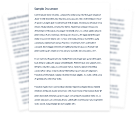Enduring Power of Attorney (NSW)
An Enduring Power of Attorney can be used to give an attorney the authority to act on your behalf even if you lose your mental capacity to manage your own affairs.
4.7 (14 reviews)
Last updated February 14, 2025
Under 15 minutes
Suitable for Australia
Written by Edwin Montoya Zorrilla
Reviewed by Damin Murdock
Document Overview
An enduring power of attorney is a legal document that allows you to nominate one or more persons (referred to as attorneys) to act on your behalf. An enduring power of attorney gives the attorney the authority to manage your legal and financial affairs, including buying and selling real estate, shares and other assets, operating your bank accounts and spending money on your behalf.
The attorney’s power continues even if for any reason you lose your mental capacity to manage your own affairs. Once you lose your mental capacity you cannot revoke this power of attorney. If you want the power of attorney to cease if you lose your mental capacity, use the general power of attorney form. An attorney under an enduring power of attorney cannot make decisions about your lifestyle or health. These decisions can only be made by a guardian (whether an enduring guardian appointed by you or a guardian appointed by the Civil and Administrative Tribunal or the Supreme Court). For a power of attorney that ceases where you lose your mental capacity, use Lawpath's General Power of Attorney (NSW).
It is strongly advised that any customisation of this form should be restricted to the fields in the questionnaire, as the legislation requires specific wording to be used. Where text remains that is not applicable to your circumstances, such as the text relating to how multiple attorneys will exercise their powers, this text should be left in its original form.
The prescribed witness certificate in clause 6 of this form must be completed. Before acting as your attorney, the attorney (including any substitute attorney) must sign the acceptance in clause 7 of this form.
It is IMPORTANT that you do not electronically sign this document. In New South Wales, powers of attorney may be electronically witnessed but not signed. We recommend that you print out the document and sign it by hand, and if you are having the document witnessed electronically, follow the procedure laid out in our article on electronic witnessing.
Important information
- A power of attorney is an important and powerful legal document. You should get legal advice before you sign it.
- It is important that you trust the person you are appointing as attorney to make financial decisions on your behalf. Your attorney must be over 18 years old and must not be bankrupt or insolvent. If your financial affairs are complicated, you should appoint an attorney who has the skills to deal with complex financial arrangements.
- A power of attorney cannot be used for health or lifestyle decisions. You should appoint an enduring guardian under the Guardianship Act 1987 if you want a particular person to make these decisions. For further information, contact the Civil and Administrative Tribunal or NSW Trustee and Guardian.
- Clause 2 of the power of attorney contains powers which will permit your attorney to use your money and assets for the attorney or anyone else as provided. You should only tick a box in clause 2 if you want your attorney to have that power.
- This power of attorney is for use in New South Wales only. If you need a power of attorney for interstate or overseas, you may need to make a power of attorney under their laws. The laws of some other States and Territories in Australia may give effect to this power of attorney. However, you should not assume this will be the case. You should confirm whether the laws of the State or Territory concerned will in fact recognise this power of attorney.
- Your attorney must keep the attorney’s own money and property separate from your money and property, unless you are joint owners, or operate joint bank accounts. Your attorney should keep reasonable accounts and records about your money and property. The cost of providing and maintaining these records by the attorney may be recoverable from you.
- If your attorney is signing certain documents that affect real estate, the power of attorney must be registered at Land and Property Information. Please contact LPI on 1300 052 637 to see whether the power of attorney must be registered.
- An attorney must always act in your best interest. If your attorney does not follow your directions or does not act in your best interest, you should consider revoking the power of attorney. You will only be able to do so while you retain your mental capacity. If you revoke the power of attorney you should notify the attorney, preferably in writing, that they are no longer your attorney. The attorney must stop acting immediately once they have knowledge of the revocation.
- This power of attorney does not automatically revoke earlier powers of attorney made by you. If you have made an earlier power of attorney that you do not want to continue, you must revoke the earlier power of attorney. It is advisable that you notify the attorney, preferably in writing, of the revocation, if you have not already done so. You should also give notice of the revocation to anyone who is aware of the earlier power of attorney, such as a bank.
Notes for completion
Joint attorneys
If you appoint more than one attorney, you should indicate whether the attorneys are to act jointly or jointly and severally. Attorneys who are appointed jointly are only able to act and make decisions together.
Attorneys who are appointed jointly and severally (ie together or separately) are able to act and make decisions independently of each other. However, you can specify that a simple majority (if you appoint 3 or more attorneys) must agree before they can act.
Substitute attorneys
If you appoint a substitute attorney, the substitute attorney will only have authority to act as your attorney if the first appointed attorney dies, resigns or vacates their position.
You can specify for whom the substitute is to act (eg if you appoint A and B as attorneys and X and Y as substitutes, you can specify that X takes A’s place if A vacates office).
Attorney vacates office
Section 5 of the Powers of Attorney Act 2003 states that there is a vacancy in the office of attorney if the attorney dies, resigns, becomes bankrupt, loses mental capacity or the authority to act is revoked.
If you have appointed a substitute attorney, it may be helpful that some sort of documentation evidencing the vacation of the original attorney is attached to this power of attorney when that vacancy happens. This will assist to satisfy a third party that the substitute attorney is entitled to act for you.
Further information
For information on powers of attorney, the attorney’s duties and registration, contact Land and Property Information, the NSW Trustee and Guardian, a solicitor or a trustee company.
The NSW Government’s Planning Ahead Tools website provides up-to-date information and resources about powers of attorney, enduring guardianship, wills and advanced care planning.
The Legal Risk Score of a Enduring Power of Attorney (NSW) Template
Our legal team have marked this document as high risk considering:
- It takes control of important decisions away from the principal.
- It places a high liability risk on the attorney.
- There are specific execution and drafting requirements, with little room for error when completing the document.

Enduring Power of Attorney (NSW) Checklist
Complete your free Enduring Power of Attorney (NSW) with our checklist
Get the right individuals to sign and witness the document
The questionnaire and description outline requirements regarding signing and witnessing.
Send the power of attorney to relevant parties
Provide the document to any parties that are dealing with the attorney acting on the principle's behalf.
View Sample Enduring Power of Attorney (NSW)
It's never been so easy
Sign-up to a free Lawpath account
Get started and we'll take care of you. It's that easy.
Browse our 500+ legal documents
Browse our 500+ legal documents to find the perfect match to cover your business needs. We've got Compliance, Employment, Service agreements and more.
Collaborate with e-Sign and Sharing
Having access to your legal documents has never been easier. You can request e-signature, share the document and download for an efficient collaboration.
Create unlimited legal documents and eSignatures for only $39/month.
Upgrade to a Lawpath legal plan to boost your new business.


Here's what people say about Lawpath's Enduring Power of Attorney (NSW)
Reviews are managed by BazaarVoice and comply with the BazaarVoice Authenticity Policy. Reviews are independently verified by BazaarVoice and detail our customers' real experiences.
0 reviews
Most Recent
Highest to Lowest Rating
Lowest to Highest Rating

